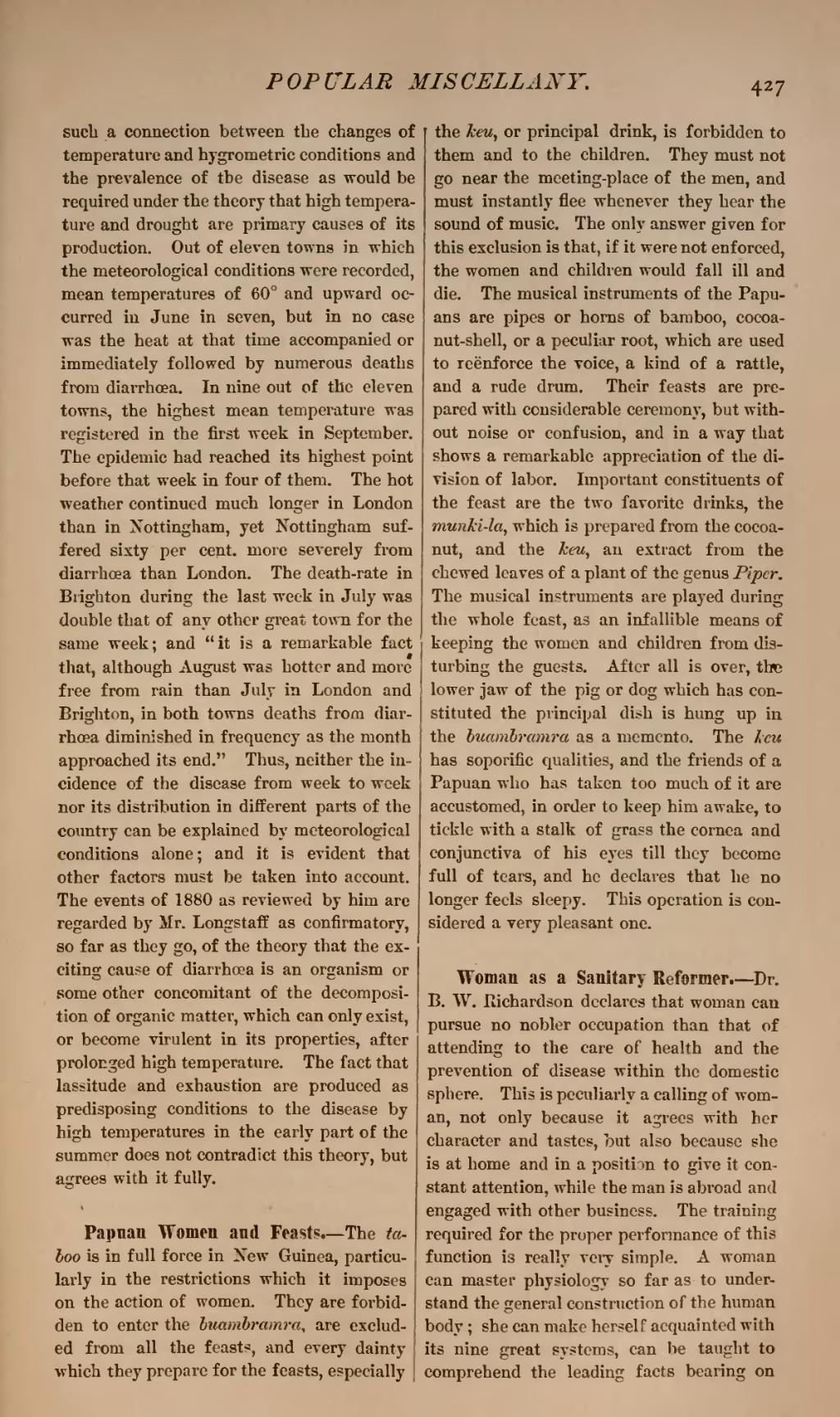such a connection between the changes of temperature and hygrometric conditions and the prevalence of the disease as would be required under the theory that high temperature and drought are primary causes of its production. Out of eleven towns in which the meteorological conditions were recorded, mean temperatures of 60° and upward occurred in June in seven, but in no case was the heat at that time accompanied or immediately followed by numerous deaths from diarrhoea. In nine out of the eleven towns, the highest mean temperature was registered in the first week in September. The epidemic had reached its highest point before that week in four of them. The hot weather continued much longer in London than in Nottingham, yet Nottingham suffered sixty per cent, more severely from diarrhoea than London. The death-rate in Brighton during the last week in July was double that of any other great town for the same week; and "it is a remarkable fact that, although August was hotter and more free from rain than July in London and Brighton, in both towns deaths from diarrhoea diminished in frequency as the month approached its end," Thus, neither the incidence of the disease from week to week nor its distribution in different parts of the country can be explained by meteorological conditions alone; and it is evident that other factors must be taken into account. The events of 1880 as reviewed by him are regarded by Mr. Longstaff as confirmatory, so far as they go, of the theory that the exciting cause of diarrhœa is an organism or some other concomitant of the decomposition of organic matter, which can only exist, or become virulent in its properties, after prolonged high temperature. The fact that lassitude and exhaustion are produced as predisposing conditions to the disease by high temperatures in the early part of the summer does not contradict this theory, but agrees with it fully.
Papuan Women and Feasts.—The taboo is in full force in New Guinea, particularly in the restrictions which it imposes on the action of women. They are forbidden to enter the buambramra, are excluded from all the feasts, and every dainty which they prepare for the feasts, especially the keu, or principal drink, is forbidden to them and to the children. They must not go near the meeting-place of the men, and must instantly flee whenever they hear the sound of music. The only answer given for this exclusion is that, if it were not enforced, the women and children would fall ill and die. The musical instruments of the Papuans are pipes or horns of bamboo, cocoanut-shell, or a peculiar root, which are used to reënforce the voice, a kind of a rattle, and a rude drum. Their feasts are prepared with considerable ceremony, but without noise or confusion, and in a way that shows a remarkable appreciation of the division of labor. Important constituents of the feast are the two favorite drinks, the munki-la, which is prepared from the cocoanut, and the keu, an extract from the chewed leaves of a plant of the genus Piper. The musical instruments are played during the whole feast, as an infallible means of keeping the women and children from disturbing the guests. After all is over, the lower jaw of the pig or dog which has constituted the principal dish is hung up in the buambramra as a memento. The keu has soporific qualities, and the friends of a Papuan who has taken too much of it are accustomed, in order to keep him awake, to tickle with a stalk of grass the cornea and conjunctiva of his eyes till they become full of tears, and he declares that he no longer feels sleepy. This operation is considered a very pleasant one.
Woman as a Sanitary Reformer.—Dr. B. W. Richardson declares that woman can pursue no nobler occupation than that of attending to the care of health and the prevention of disease within the domestic sphere. This is peculiarly a calling of woman, not only because it agrees with her character and tastes, but also because she is at home and in a position to give it constant attention, while the man is abroad and engaged with other business. The training required for the proper performance of this function is really very simple. A woman can master physiology so far as to understand the general construction of the human body; she can make herself acquainted with its nine great systems, can be taught to comprehend the leading facts bearing on
